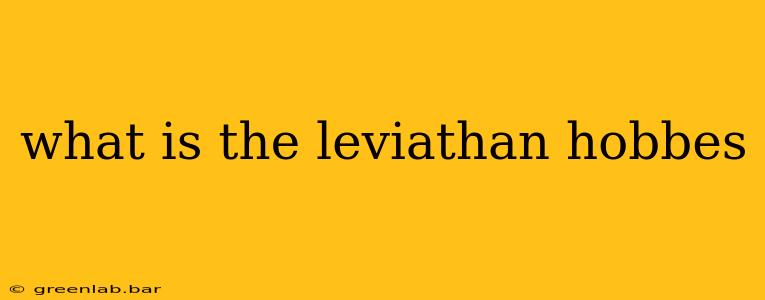Thomas Hobbes' Leviathan (1651) is far more than just a political treatise; it's a foundational text in Western political philosophy that continues to provoke debate and inspire analysis centuries after its publication. This exploration delves into the core tenets of Hobbes' masterpiece, examining its context, key arguments, and lasting influence.
The Context of Leviathan: A World in Turmoil
Hobbes wrote Leviathan amidst the English Civil War, a period of profound social and political upheaval. Witnessing the brutal realities of conflict firsthand, he sought to understand the fundamental principles governing human society and the state. The chaos surrounding him deeply shaped his pessimistic view of human nature and his advocacy for a powerful sovereign.
Hobbes' View of Human Nature: The State of Nature
Central to Hobbes' philosophy is his concept of the "state of nature," a hypothetical scenario without government or societal structures. He famously described this state as "a war of all against all," where life is "solitary, poor, nasty, brutish, and short." In this pre-political condition, individuals are driven by self-interest and a relentless pursuit of power, leading to constant conflict and insecurity.
The Social Contract and the Sovereign Power
To escape this brutal state of nature, Hobbes argued that individuals must enter into a social contract, surrendering certain individual rights to a sovereign power – be it a single monarch or an assembly. This sovereign possesses absolute authority, necessary to maintain order and prevent society from descending into chaos. The contract isn't a negotiation; it's a necessary condition for survival.
Key Concepts in Leviathan:
- Sovereignty: Absolute and undivided power vested in the sovereign, essential for maintaining order and security. Hobbes believed that any limitations on sovereign power would inevitably lead to conflict and the breakdown of society.
- Law of Nature: Hobbes outlined several laws of nature, derived from reason, that guide individuals toward self-preservation. The most important is the fundamental law: seek peace, and follow it. However, he understood that these laws are ineffective without a powerful enforcer.
- The Materialist Conception of Humanity: Hobbes posited a purely materialistic view of humanity, rejecting any notion of an immortal soul or divine right. Human actions are driven by the pursuit of self-preservation and power.
The Lasting Influence of Leviathan:
Leviathan has had a profound and enduring impact on political thought. Its influence can be seen in:
- The development of social contract theory: Hobbes’ work laid the groundwork for subsequent social contract theorists like John Locke and Jean-Jacques Rousseau, who built upon and critiqued his ideas.
- The justification of state power: Hobbes' arguments have been used to justify strong, centralized governments throughout history.
- Contemporary political debates: The tension between individual liberty and state authority remains a central theme in contemporary political discourse, echoing Hobbes' central concerns.
Criticisms of Leviathan:
Despite its considerable influence, Leviathan has faced significant criticism. Critics argue that:
- Hobbes' pessimistic view of human nature is overly simplistic: It fails to account for the capacity for cooperation and altruism inherent in human beings.
- His advocacy for absolute sovereignty can be seen as a justification for tyranny: Critics point to the potential for abuse of power under a system with unlimited authority.
- The social contract is a problematic concept: Some argue that it is unrealistic to assume that individuals would freely consent to surrendering such extensive rights to a sovereign.
Conclusion: A Timeless Exploration of Power and Society
Thomas Hobbes' Leviathan remains a relevant and challenging text. While its pessimistic view of human nature and advocacy for absolute sovereignty may be controversial, its exploration of the relationship between individual liberty, state power, and social order continues to resonate with readers today. It serves as a crucial starting point for anyone seeking to understand the foundational principles of political philosophy and the enduring quest for a stable and just society.

